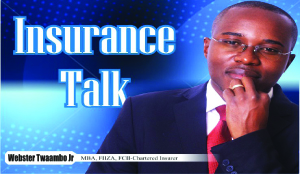 A few months ago the kwacha was trading under K6 to a dollar but today it has risen to about K10 representing some considerable depreciation in value.
A few months ago the kwacha was trading under K6 to a dollar but today it has risen to about K10 representing some considerable depreciation in value.
Zambia being a predominantly importing country, this depreciation has had some deleterious effects on most commodities.
Today we will look at some of the effects of the free-falling kwacha in the insurance context.
The first impact is that people who are insured in Kwacha may find themselves underinsured.
This can easily be illustrated by way of an example.
If Mr X imported a vehicle at landed cost of K50, 000 when the currency was say K5 then, it means he needed U$10,000 to complete his transaction and then insure the vehicle for that amount on comprehensive basis i.e. reflective of the market value.
At today’s exchange rate the sum insured of K50,000 is only able to buy US$5,000 at the rate of K10 per dollar.
Clearly with U$5,000 Mr X cannot import a similar vehicle.
This conundrum is necessitated by the fact that we are an importing country.
A Ford Ranger bought about six months ago and insured at the dealers purchase price (in kwacha) will today be underinsured because prices have been pushed up by the weakening kwacha.
If the customer does not revise their kwacha sum insured they may not be able to buy another similar vehicle should there be a total loss claim.
Under the same token repair costs for insurers have gone up because dealers have to import spare parts.
This can also lead to inadequate sums insured that may force insurers to technically write off otherwise repairable vehicles but for the cost of repairs.
When repair costs reach a certain threshold of about 70 per cent it becomes more economical to write off a vehicle than to repair it.
This significantly puts pressure on the bottom line of insurers.
The other impact I will discuss today is the artificial increase in gross written premiums from those customers who insure in dollars.
Insurers by default prepare their statements in the local currency.
If a customer insures today at the exchange rate of K10 to a dollar when the ‘ideal’ or projected rate was K6 to a dollar, the performance of the company will show a sharp growth of K4 which was necessitated by exchange rate gain.
Such a result may easily help an insurer meet their budget if there was no currency adjustment.
In fact two players, one with a lot of dollar business may show great performance than one with more kwacha business.
Without much analysis the former’s performance is deceiving and is not sustainable in the long run and may be badly hit if the reverse happens.
Let us look further into what I mean by the forgoing.
If the exchange rate last year in this month was about K7 the company this year will record a positive variance or growth of K3 for the same amount of business.
However if the rate next year in the same month goes down to say K5 it will create some negative variance of 50 per cent i.e. assuming this year’s rate is at K10.
For a company that is expected to grow year-on-year such an impact will create a lot of pressure.
There is, therefore, need for great care from insurers in these analytics.
On the reinsurance side, it is insurers with a pre-agreed exchange rate on a treaty that will feel the impact of currency fluctuation because they will need more kwacha to buy forex.
The risk with the reinsurer’s loss in that they may start refusing to quote in kwacha thereby passing the exchange loss to the local insurer.
On facultative business, provided business is transacted in the same currency as the insured places and pays for their policy there should not be much to worry about by the insurer unless the reinsurer quotes in dollars for a policy running in kwacha then the insurer will need more kwacha to buy dollar hence incurring an exchange rate loss.
The same rationale applies when insurers are making recoveries.
Comments:webster@picz.co.zm or webster_tj@hotmail.com or on face book search for Insurance Talk-Zambia page or call/text 0977 857 055
(The author is a Chartered Insurer with more than 11 years industry experience)






